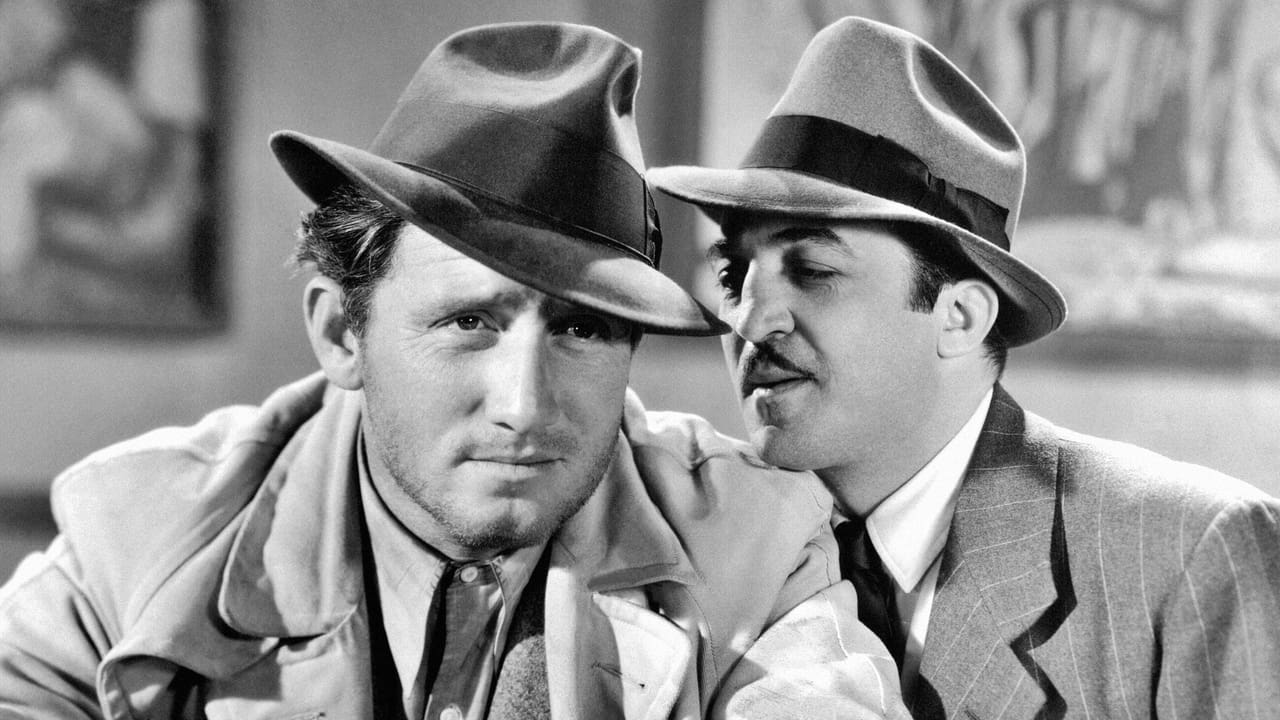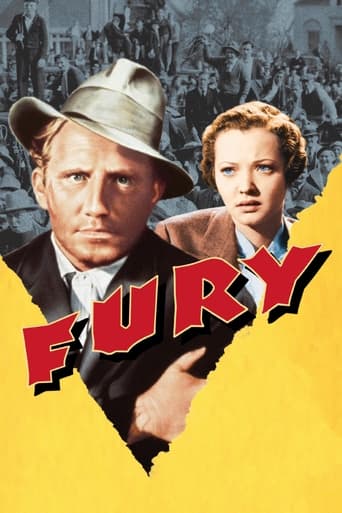

Directed by Fritz Lang, who co-wrote the screenplay with Bartlett Cormack that was based on Norman Krasna's story, this essential drama, an indictment of "mob rule", features Spencer Tracy, Sylvia Sidney, and Walter Brennan (among others). Krasna received an Academy Award nomination for his Original Story. The film was added to the National Film Registry in 1995.Tracy, with fiancée Sidney, is suspected of kidnapping and arrested by Brennan. An angry mob, led by Bruce Cabot, is incensed and storms the jail where Brennan can't stop them from burning it down. Sidney and the others assume Tracy was killed in the fire, but he wasn't. He shows up at his brother's (Frank Albertson) and learns that the real kidnappers have been caught. So, he wants the mob prosecuted for "lynching" him. Walter Abel is the DA who pursues a conviction against a couple of dozen from the crowd.The problem is, of course, Tracy wasn't actually killed, even though everyone (save his brother) thinks he is. Can he be convinced not to go through with his revenge which may mean the execution for murder of many people?
... View MoreCuriously titled, there are two lots of "fury" to consider in this film as an angry mob burn down the jail where an innocent stranger is being held on circumstantial evidence, while subsequently the stranger survives and in a fit of anger decides to keep his survival a secret in order that the lynch mob can be prosecuted for first degree murder. It is an interesting premise and Spencer Tracy is superb in the lead role, playing a character who becomes ever-so-slowly less sympathetic with his increasingly bloodthirsty desire for revenge. Walter Abel also provides good support as the district attorney in charge of the case who maintains a sense of humour in court, while Sylvia Sidney is effective as Tracy's girlfriend, shown in striking close-up at several key points. The completely silent scene in which she rushes to see the jail alight is an utterly breathtaking sequence and with Fritz Lang at the helm the film looks as good as one would expect. For all its virtues, 'Fury' is not a subtle film though, and it is hard to say what comes off as more detrimental: the loud thunderstorms that only start up as Tracy argues with his brothers near the end, or Tracy's preachy speech in the final scene. The plot is also a little hard to buy at times (would Tracy really be locked up over such sketchy evidence?), but if nothing else, 'Fury' will definitely make you think twice about carrying salted peanuts in your pocket. The intense scenes of the angry mob in action also offer a stark reminder of just how irrational we, as human beings, can be in the wrong set of circumstances.
... View MoreThe hard worker Joseph "Joe" Wilson (Spencer Tracy) and the teacher Katherine Grant (Sylvia Sidney) are in love with each other, but they do not have enough money to get married. Katherine gets a better job in Washington and together with Joe, they save money to get married one year later. Joe quits his job in the factory and uses his savings to buy a gas station, working with his brothers Charlie (Frank Albertson) and Tom (George Walcott). He makes enough money to get married with Katherine and buys a car. While driving with his dog Rainbow to meet his fiancée, Joe is stopped in Strand by the redneck Deputy "Bugs" Meyers (Walter Brennan) as suspect of kidnapping a boy in the Peabody Case. When they find peanuts in his pocket and a five-dollar bill in his pocket with the numeration of the money paid for ransom, Joe is arrested in jail for investigation."Bugs" Meyers makes a comment in the barbershop about the prisoner and sooner the gossip is spread in the little town. As a tale never loses in the telling, Joe is accused by the population of kidnapper and they try to invade the police station to lynch him. For political reason, Governor Burt (Howard Hickman) does not send the National Guard to help Sheriff Tad Hummel to protect Joe and the Police Station is burnt down by the vigilantes. Katherine witnesses the action and has a breakdown. Joe is presumed dead but out of the blue he appears at his brothers' apartment seeking justice. He had learnt that in accordance with the laws, Lynch Law is murder in the first degree and his brothers open a case against twenty-two dwellers of Strand. The prosecutor Mr. Adams accepts the case and Katherine Grant is the prime witness. Joe's revenge is set in motion. "Fury" tells the heartbreaking story of dehumanization of a good man and hard worker that believes in the justice and loves his country through the imprisonment and subsequent lynching by despicable people moved by gossip. Fritz Lang makes another excellent feature in his first American work, and I enjoyed the gossip sequence that ends in a brood of hens.The story is engaging with a great revenge of the bitter Joe. I would love to see the twenty-two defendants going to the gallows, but the moralist conclusion works perfectly in the story. My vote is eight.Title (Brazil): "Fúria" ("Fury")
... View MoreIt's Fritz Lang's illustrated gloss on Aristotle's observation that "At his best, man is the noblest of all animals; separated from law and justice he is the worst." Lang himself, an escapee from the Nazis, was a fascinating director, given to striding around in riding breeches and boots, shouting orders through a megaphone, seeing things through a monocle. He directed a couple of pot boilers but seemed attracted most to stories of revenge -- taken too far. You can see it in "Rancho Deluxe" and "The Big Heat." Sometimes the work looks a little crude today but it's sublime in comparison to modern revenge movies like "The Punisher" and "Sudden Impact." "Fury", though it has its crude moments, is a fine moral lesson and a decent study of human nature. Spencer Tracy is in love with Sylvia Sidney, who is leaving him in Chicago for a better paying job out West, where he will join her after saving a bit of money. This is 1936 and everybody is broke. The two of them ache for marriage. He finally drives west but is coincidentally caught up in a man hunt for four kidnappers and held by a hick sheriff because, like one of the miscreants, he's fond of salted peanuts and happens to be carrying a five-dollar bill with the same serial numbers as one of the ransom notes. This is probably an echo of the Lindbergh kidnapping and murder, a sensation in the early 30s.Before he can be tried, the local newspaper convicts him and gossip spreads through the small town, exaggerating the thin evidence against him. Lang adopts a silent-movie technique and during a montage of women gossiping inserts a shot of a clutch of hens clucking.At any rate the mob attacks the jail in which Tracy is being held. Unable to reach him in his cell, they set fire to the building and in a striking shot, Lang shows us the frantic Tracy pressed against the window bars, surrounded by flames, while the crowd stands outside and watches him in utter silence, grinning, until they drive him from the window with a shower of stones.Briefly, Tracy secretly escapes and through the agency of his two brothers brings two dozen mob members to trial for murder. Where the money for this suit came from is a mystery. But the experience has burned Tracy, body and soul. He skulks in his brothers' apartment, grinning demonically as the trial proceeds and the twenty-two defendants wriggle and squirm. They're supposed to be suffering from monumental remorse as well, but we see little of it. If given the MMPI they'd probably produce the "caught psychopath" pattern -- high in psychopathy and high in depression, because after all they've been caught. Tracy is turning into an obsessed maniac himself, forging evidence, going unshaven, drinking, bitter, looking like Mister Hyde.I won't reveal the end. It's a rather long film but not one that's liable to put you to sleep. Some of the courtroom dialog is rather sophisticated, or at least so it sounds to untutored ears. The "crudities" I mentioned earlier include some confusion about what's taking place and where. The little town is called Strand. But at one point, when I thought Tracy was sneaking around the streets of Strand, he stops and peers through a shop window that's in Chicago. Capital City is mentioned but if anything takes place there I missed it.None of these carps detract from an interesting film involving some tough moral choices.
... View More